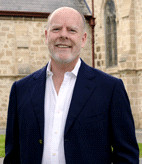
“Both the church and the state were divinely given in the simple order of human society. Therefore god works not just through the church but also through the state as well,” said Prof Rowan Strong, when he delivered his lecture entitled: "Anglicanism and Imperialism".
He outlined how both religion and government, as god-intended creations, worked together.
“We may think of the church as made up of two institutions but in the beginning the state was a god-given thing,” he argued and emphasised that both these systems were created out of god's will.
He said this during his seminar on Anglicanism and British Imperialism (from 1700 to 1850), held at Rhodes University's Faculty of Humanities recently.
Based on his book 'Anglicanism and the British Empire' released in 2007, the lecture demonstrated how British government, made up of an imperial regime had integral link to the British churches but more specifically to Anglicans.
A compilation of research that serves to explain the Anglican Christian understanding of imperial Britain and how it influenced people and colonists in British colonies in North America, Australia and New Zealand and Bengal.
This engagement led to the Church of England's becoming one of Britain's most religious and politically influential faith establishments and lifted a public theological discourse of the imperial forces.
Prof Strong's research revealed that from the foundation of the Society for the Propagation of the Gospel in Foreign Parts in 1701, “the Church of England exhibited an official and conscious Anglican concern for empire and for missions by the Church of England”.
However throughout the centuries and with the introduction of modern politics, the partnership between the two deterred.
“There is an official mentality at the level of governance because imperial government moves away from funding to the Church of England through parliament, because it had all sorts of constituencies through the 19th century,” said Prof Strong.
He elaborated that by the end of the 19th century debates in parliament were not only being conducted by Anglicans but by other faiths and even non-conformists.
Rhodes Dean of Humanities, Professor Fred Hendricks expressed his honour at hosting such a prominent academic with a firm religious stronghold.
He said that as an institution, the university has been debating the issue of whether having secular culture in the university was ideal. Prof Hendricks argued that it might arise conflicts among the different nationals and creeds that make up the university.
Prof Strong is also currently working on 'The Oxford History of Anglicanism: Series Editor and Editor of volume 3 Partisan and Colonial Anglicanism of1829-1914', which looks at the diversity of the Anglicanism identity.
The 'Religion and the British Emigrant Experience' of 1845-1900 explains a religious dimension of the peak period of British emigration to British colonies and the United States.
He examines a new form of Protestant missions undertaken by Anglo-Catholics in the Church of England in the 'Anglo-Catholic Missions in the Nineteenth Century' research.
By Andile Nayika
Photo Source: Murdoch University
